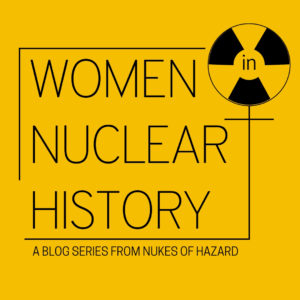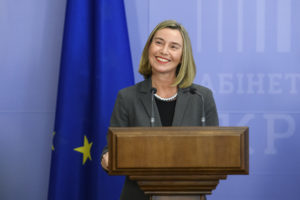By Rachel Emond, Scoville Fellow
 Federica Mogherini: The chief diplomat of the European Union who rose to political power despite misplaced concerns about her readiness, and served as a driving force behind successful JCPOA negotiations.
Federica Mogherini: The chief diplomat of the European Union who rose to political power despite misplaced concerns about her readiness, and served as a driving force behind successful JCPOA negotiations.
The European Union has made achieving gender parity in decision-making a top priority since 2016, and though their intentions are commendable, they still have a lot of work to do. At the beginning of May, the President of the European Council, Donald Tusk, stated that achieving gender parity among the most senior EU positions would be “difficult to achieve.” He added that his idea of true gender balance would mean an equal number of men and women, and that he would do his “best to build more balance than today.” Currently, among the top posts of the EU, there sits only one woman: Federica Mogherini.
Federica Mogherini is an Italian national, born in Rome to a “normal family,” she says. Her mother worked as both an architect and a teacher, while her father was in the Italian film industry. It might sound fancy, but she asserts that hers was not the “glitzy,” “party-hopping” life that many children connected to the film industry experienced. She credits her mother with instilling a sense of independence and autonomy within her, which led to interests in journalism, Islam, the Arab world, and later, politics.
Federica—fluent in English and French, as well as her native Italian—graduated from the University of Rome with a degree in Political Science and a thesis on political Islam. She would go on to be elected to Parliament in Italy in 2008, and, at 41 years old, become the country’s youngest-ever Minister of Foreign Affairs and International Cooperation. Shortly after being appointed to this position, she became the EU’s High Representative for Foreign Affairs and Security Policy.
Her nomination to and consideration for this position was widely debated. She received constant, intense criticism for her age and purported inexperience, that she refuted as being rooted in both ageism and sexism. “I paid a little bit of a price for being a young woman,” she stated. “A relatively young woman is perceived as younger than a relatively young man.”
Federica was praised throughout her career, though, by those who watched her unprecedented rise through the Italian political system. Marina Sereni, a minister who became familiar with Federica when she joined the youth arm of the Democratic Party of the Left, said she was always well-prepared, calm, and professional, especially for her young age. Chiara Moroni, a right-leaning member of Parliament, said Federica was “always on top of her brief, she had always done the reading…Federica is something rare in Italian politics: she got to where she is entirely on merit.”
During negotiations of the Joint Comprehensive Plan of Action (JCPOA), or the Iran nuclear deal, Federica was one of a host of women who helped cinch a successful outcome. In a UN resolution that passed in 2006, the position of the High Representative for Foreign Affairs and Security Policy for the European Union—i.e. the EU’s chief diplomat—was designated as the neutral facilitator between Iran and the other negotiating countries: Britain, France, Germany, China, Russia, and the United States. Federica stepped into this position in 2014 following Catherine Ashton. Her dedication to maintaining the positive relationship with Tehran that Ashton established allowed her to “set the agenda and drive the process,” according to Catherine Ray, one of Federica’s spokespersons. She also leaned heavily on her deputy, Helga Schmid, whose strong and experienced technical understanding balanced Federica’s political expertise.
Federica has been a strong advocate for the involvement of women in peace and security negotiations throughout her tenure. She has made this a priority particularly as the EU works with Syrian and Yemeni women to support their quest for conflict resolution in their own countries. Of the experiences she had when working with these women, she said, “This search for a common ground, this search for getting out of the zero-sum game that is so powerful in the world politics today, I think is an element that women bring to the table much more than men do…” She consistently vocalizes the important influence women have at the negotiating table, crediting their presence with more durable, higher-quality deals.
In September 2018, she and Chrystia Freeland, Canada’s Foreign Minister, hosted a gathering of women foreign ministers in Montreal. On her blog, Federica discussed why she thought this meeting was important, “…we realised, through our daily work, what a special contribution women bring to foreign policy, to peace negotiations, to national reconciliation processes…
But we also decided to hold this meeting to tell our stories to girls and women all around the world: we wanted to show that there are no jobs ‘for men only,’ and that every girl has the right to do anything she wants with her life.”
As a young woman breaking into the field of peace and security, I am inspired by Federica’s determination in the face of doubt and criticism due to her age and gender. She mused on the phenomenon, stating “…many were wondering if I was old enough to do this job, and yet I was the Foreign Minister of a G7 country, Italy, and I was wondering if age was really the problem because there are Prime Ministers and Presidents who were younger than me.”
She knew she would be successful if given the same opportunity that a man in her shoes would be given. Looking back, it certainly seems that she was right.

